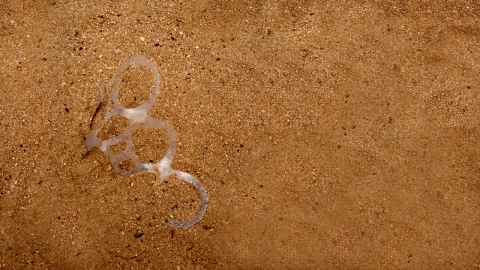Take action on land to save the seas
20 March 2018
Opinion: Wanting cleaner, plastic-free neighbourhoods and beaches does not make you a crazy person, it makes you a 'Tidy Kiwi', writes the University of Auckland's Mary A. Sewell.

The New Zealand Government has recently signed up to the United Nations CleanSeas campaign to make significant reductions to the production and use of non-recyclable plastics by 2022. Emily Frost’s article last week highlighted several other Government initiatives to reduce the impacts of plastics on the environment, including the ban on microbeads and controlling single use plastic bags. However, there are also steps that we can take as individuals to reduce the plastic that reaches our oceans, and this is as simple as not littering.
I am of a generation brought up with the 'Be a Tidy Kiwi' campaign, at a time when tossing your takeaways out the car window was the normal thing to do. During the 1960s and 70s children were taught that littering was not the act of a good public citizen, and this campaign played an important part in educating my peers and me to care for our local environments. Relaunched in 2016 to a new generation of children, it seems that the missing generations have not learned the important “Tidy Kiwi” message - that it is not OK to throw rubbish out the car window.
This past weekend, on my regular 3km neighbourhood dog walk, I collected three shopping bags full of litter – two general rubbish and one of material that could have been recycled (cans, drink bottles). Most of this rubbish came from the various chain take-away outlets near my home. Occasionally, there was the whole takeaway bag, but more usually it was loose items – serviettes, cardboard food containers – and a whole range of plastic, including drink straws, the tops of takeaway drink containers, and non-takeaway items such as lollipop sticks and cigarette butts.
Smokers, be aware that every cigarette butt that you drop on the footpath, or into the gutter, is going into the ocean.
During the next serious rainstorm a lot of this material, sitting close to the road, would be washed into the stormwater drains and directly into the oceans.
Many of us who have travelled overseas are shocked by the amount of plastic litter that we see, in towns, on beaches, and with the ubiquitous plastic bags caught in trees. But, when we come home to New Zealand, we need to look at ourselves a bit more closely. Groups such as Sustainable Coastlines have regular coastal clean-ups and this organisation alone has removed more than 91,000 plastic bags, 91,000 bottle caps and lids, and 200,000 pieces of plastic from New Zealand shores. It is rare that you can take a walk on any New Zealand beach without seeing plastic waste.
To reduce the impact of plastics on our oceans, we all need to do our part:
First, 'Be a Tidy Kiwi' and do not litter in the first place. For that missing generation it is not OK to throw your rubbish out the car window. Take your waste to a bin and then recycle what you can. If you are out and the rubbish bin that you find is over-flowing, then carry it to another bin or take it home with you to dispose of properly.
Second, for smokers, be aware that every cigarette butt that you drop on the footpath, or into the gutter, is going into the ocean. Cigarette butt filters are also plastic and Keep New Zealand Beautiful estimates that over 60 million cigarette butts are discarded into our environment every year.
Third, take an active role in cleaning up litter in your neighbourhoods to stop that plastic reaching the oceans - or remove it from the shoreline when it has got there. Groups such as Pick up Three Pieces or Take 3 For the Sea also encourage beach users to take home a few pieces of plastic or litter and dispose of it appropriately, or organised beach clean-ups such as those of 'Sustainable Coastlines' are a good place to start.
And remember, wanting cleaner, litter- and plastic-free neighbourhoods and beaches does not make you a crazy person, it makes you a 'Tidy Kiwi'.
Professor Mary A. Sewell is from the School of Biological Sciences at the University of Auckland.
This article reflects the opinion of the author and not the views of the University of Auckland.
Republished with permission from Newsroom, Take action on land to save the seas published on Tuesday 20 March 2018.